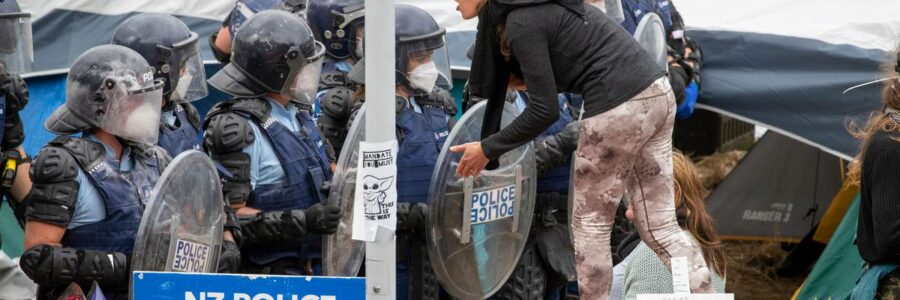
Exclusive poll: Covid 19 Omicron – What Kiwis think about vaccination mandates and the Parliament protests
A new exclusive poll shows where voters stand on when vaccination mandates should end, and reveals how much support there was for the protesters who camped out at Parliament for three weeks.
The poll, conducted for the NZ Herald by Kantar, shows almost two-thirds of voters agreed mandates are necessary for some jobs while one third either disagreed or did not feel strongly either way. There was very little appetite for keeping mandates in the long term – only 14 per cent believed the mandates should stay in place indefinitely.
In the poll of 1000 eligible voters, 65 per cent said they agreed the mandates were necessary in certain jobs, while 22 per cent disagreed and 11 per cent neither agreed nor disagreed. Only two per cent of people did not know.
The mandates are in place for teachers, health care workers, port, border, and prison workers as well as police and the defence force. Earlier this month the High Court ruled the police and defence force mandates were unlawful. The Government is yet to decide whether to appeal against that ruling. No jab-no job policies also apply in hospitality and close-contact businesses such as hairdressers under the traffic light system.
It is a drop in support from a 1 News Colmar Brunton poll taken in November last year that asked the same question. That showed 70 per cent supported the mandates and 20 per cent did not.
Asked what needed to happen before the mandates were removed, 14 per cent of people believed the mandates should remain indefinitely and 18 per cent believed the mandates should be removed immediately.
32 per cent of people chose the option of removing the mandates once Covid-19 was widespread but mild, similar to the flu and 28 per cent said it should be when hospitals were staffed and equipped to cope with a surge in admissions.
Eight per cent said it should be after an effective vaccination against Omicron was available.
The poll of 1000 eligible voters was taken from March 2-9 and has a margin of error of +/- 3.1 per cent.
In response to the poll, Prime Minister Jacinda Ardern said decisions on the mandates and vaccine certificates would be made in “coming weeks” once the worst of the Omicron outbreak was over.
She said the poll results showed that most voters also believed it should wait until then.
“We’ve been clear that we’ll start to wind back mandates in many areas and the use of tools like vaccine passes once we pass through the Omicron peak and hospitals have returned to more normal and manageable levels. This poll shows the public really share those time frames and criteria.
“We are in the peak of the outbreak right now, so it’s not the time to wind back protections helping to keep us safe. But there will become a point in coming weeks, once we are through the worst of the outbreak, where we can start putting in place those decisions.”
She said that would also be the time New Zealand opened back up to tourism and other restrictions lifted.
“Mandates and Covid protections mean we will get to the other side safer and more protected against future variants.”
In response to the poll figures, National’s Covid-19 Response spokesman Chris Bishop said “We do have to phase out vaccination mandates, they are a big intrusion on rights and can only be justified temporarily while the science supports them. Increasingly it is clear the public health rationale is diminishing.”
He said the health workers mandate was the one for which there was still the most justification, and it should remain the longest.
That was possibly partly because of the protest outside Parliament – some of those protesting were those who had lost or risked losing their jobs because of the mandates.
WHERE DID VOTERS STAND ON THE PARLIAMENT PROTESTS?
A strong majority of people were opposed to the protest – especially in Wellington – but there was 12 per cent support for it among those polled. 72 per cent said they were opposed and 14 per cent neither supported or opposed the protesters.
Perhaps unsurprisingly, opposition was higher in Wellington where 83 per cent opposed it compared to 71 per cent in Auckland and 68 per cent of those in provincial areas.
The polling period started on March 2 – the day police moved in to move the protesters out after the 23-day occupation of Parliament’s grounds and surrounding streets.
Leaders of all political parties in Wellington had refused to meet with the protesters as long as they were gathering unlawfully, although former politicians including NZ First leader Winston Peters and former National MP Matt King had visited it.
Ardern consistently dismissed the protest, saying “a significant majority” of New Zealanders did not agree with them, and pointing to anti-vax messages and misinformation coming from some of the group, as well as threats toward politicians and media in particular.
After the protest ended, Ardern said she had no regrets about her decision not to engage with the protesters. “It was a form of protest I did not recognise. And I found it hard to reconcile it with the reality of what all New Zealanders had faced in this pandemic, and yet quietly got on with it.”
Source: Read Full Article
/cloudfront-ap-southeast-2.images.arcpublishing.com/nzme/IX3KMPAKXNDSJLYZD2AYMNJ2HI.jpg)
/cloudfront-ap-southeast-2.images.arcpublishing.com/nzme/VP5JKHUIDPRUTD67YEATPK7OX4.jpg)
/cloudfront-ap-southeast-2.images.arcpublishing.com/nzme/VG2V47TP2QAJCBGI3JCMGAUJZY.jpg)